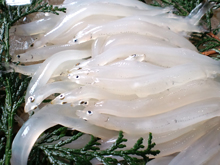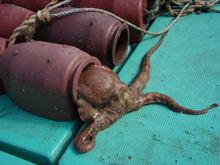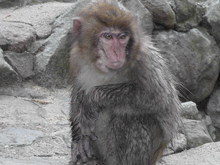Session 22—Haiku of Matsuo Bashō
Topics for this session
Bashō haiku from his travel years (mid-life)
Poems for this session
- 35 あけぼのやしら魚しろきこと一寸
- 36 古池や蛙飛びこむ水のおと
- 37 蛸壺やはかなき夢を夏の月
- 38 初しぐれ猿も小蓑をほしげなり
Details
35 あけぼのやしら魚しろきこと一寸
あけぼの | や | しらうお | しろき | こと | いっすん
Collection: 松尾芭蕉集(新編日本古典文学全集 Vol. 70) • 1684 (#198, page 112, search: 明ぼのや)
Author: 松尾芭蕉 (まつおばしょう・ばせを)
季語: しら魚(春)
切字: や
 Special requests in preparation for poem:
Special requests in preparation for poem:
- Read Interpreters (bSpace, Basho haiku - akebonoya ya)
- View the following Web site or image search on your own 白魚: 日本料理作一 blog
36 古池や蛙飛びこむ水のおと
ふるいけ | や | かはづ | とびこむ | みづ | の | おと
Collection: 松尾芭蕉集(新編日本古典文学全集 Vol. 70) • 1686 (#267, page 146, search: 古池や)
Author: 松尾芭蕉 (まつおばしょう・ばせを)
季語: 蛙(春)
切字: や
Special requests in preparation for poem:
- Read Interpreters (bSpace, Basho haiku - furuike ya)
37 蛸壺やはかなき夢を夏の月
たこつぼ | や | はかなき | ゆめ | を | なつ | の | つき
Collection: 松尾芭蕉集(新編日本古典文学全集 Vol. 70) • 1688 (#385, page 205, search: 蛸壺や)
Author: 松尾芭蕉 (まつおばしょう・ばせを)
季語: 夏の月(夏)
切字: や
 Special requests in preparation for poem:
Special requests in preparation for poem:
- Read Interpreters (bSpace, Basho haiku - takotsubo ya)
- Go here to see the octopus hunting process using 蛸壺 (even if you think it is sad ...): 平郡島の蛸壺漁
38 初しぐれ猿も小蓑をほしげなり
はつしぐれ | さる | も | こみの | を | ほしげなり
Collection: 松尾芭蕉集(新編日本古典文学全集 Vol. 70) • 1689 (#586, page 318, search: 初しぐれ)
Author: 松尾芭蕉 (まつおばしょう・ばせを)
季語: 初しぐれ(冬)
切字: ほしげなり(終止形)
Special requests in preparation for poem:
- Read Interpreters (bSpace, Basho haiku - hatsushigure)

.jpg)
Poems are covered in the order presented. We may not be able to discuss all poems listed. It is likely that I will add links and preparating requests as we go along, even in the last hour before class. There is no class participation grade so all of this work is optional, but interesting, and will enhance your ability to share in the session. Poem details are given in class and not repeated. Take excellent notes. They are the basis for the test. Our course goals in order of priority: 1) above all, appreciation of the poem as a poem, 2) understanding the components of the poems (the words in their function as grammar and their history in poems), 3) details of authors and collections. Prepare with these priorities in mind.